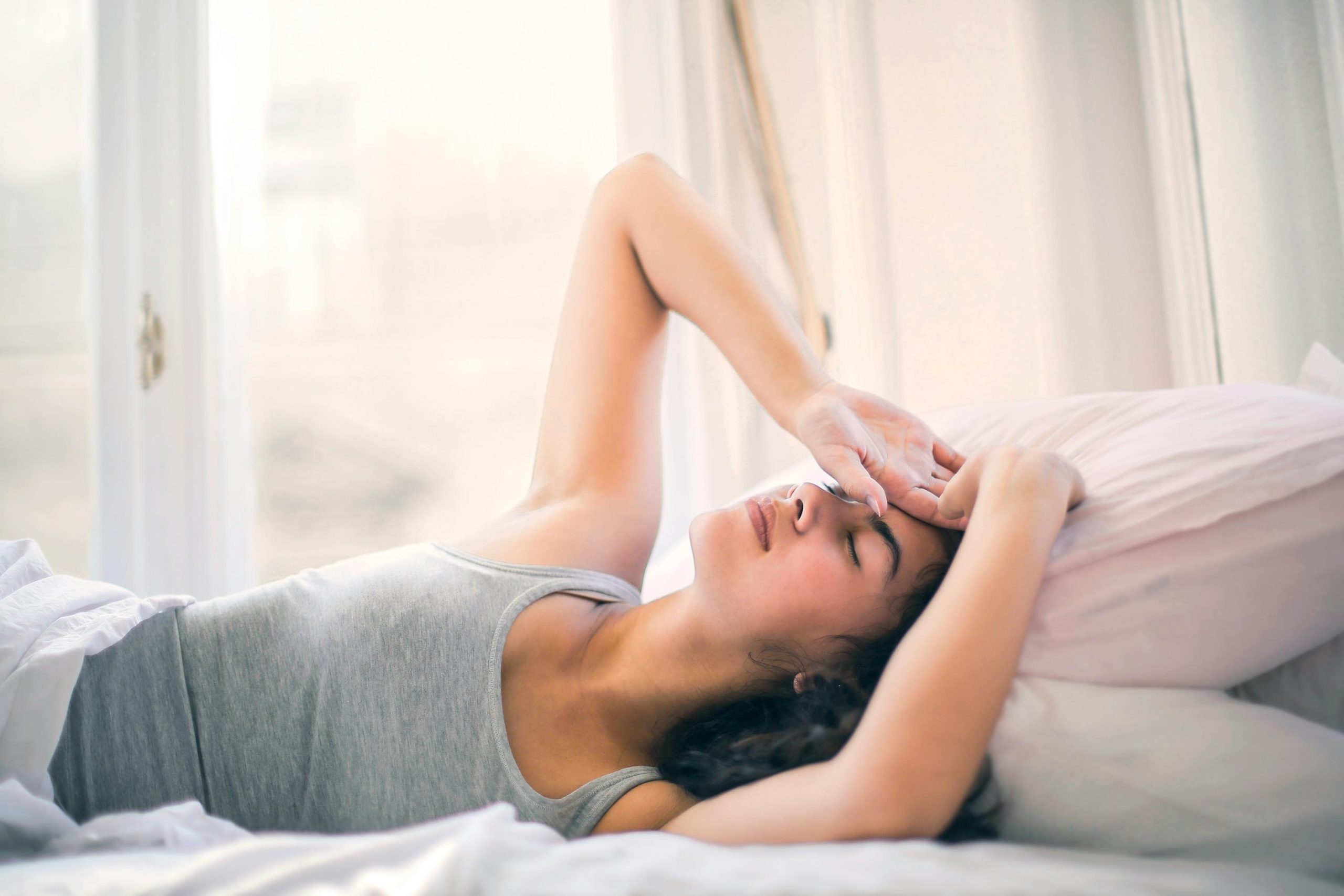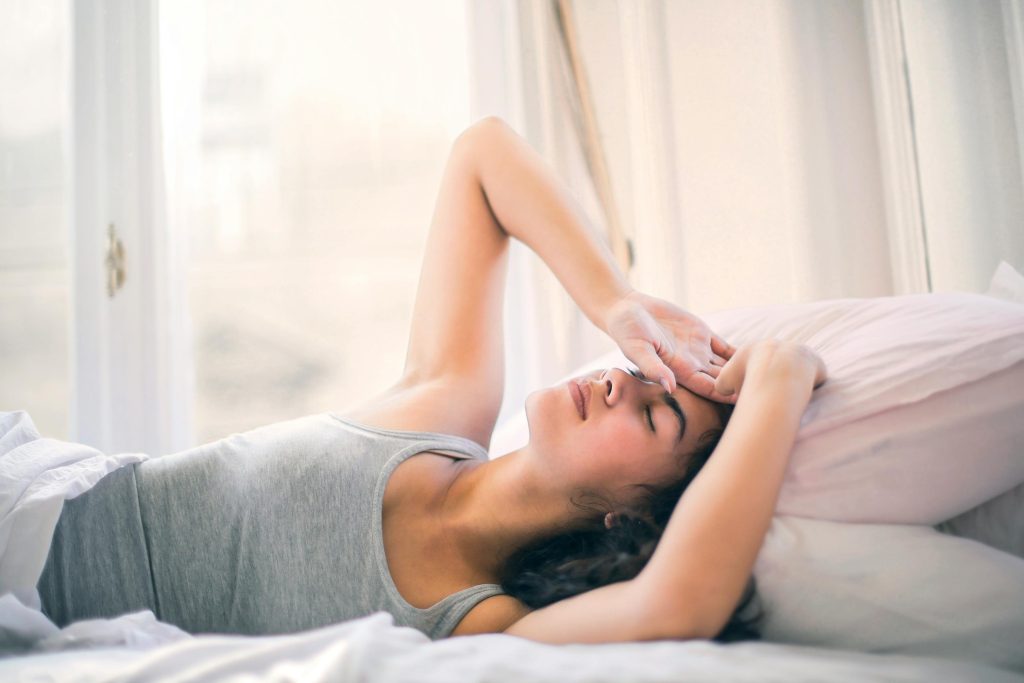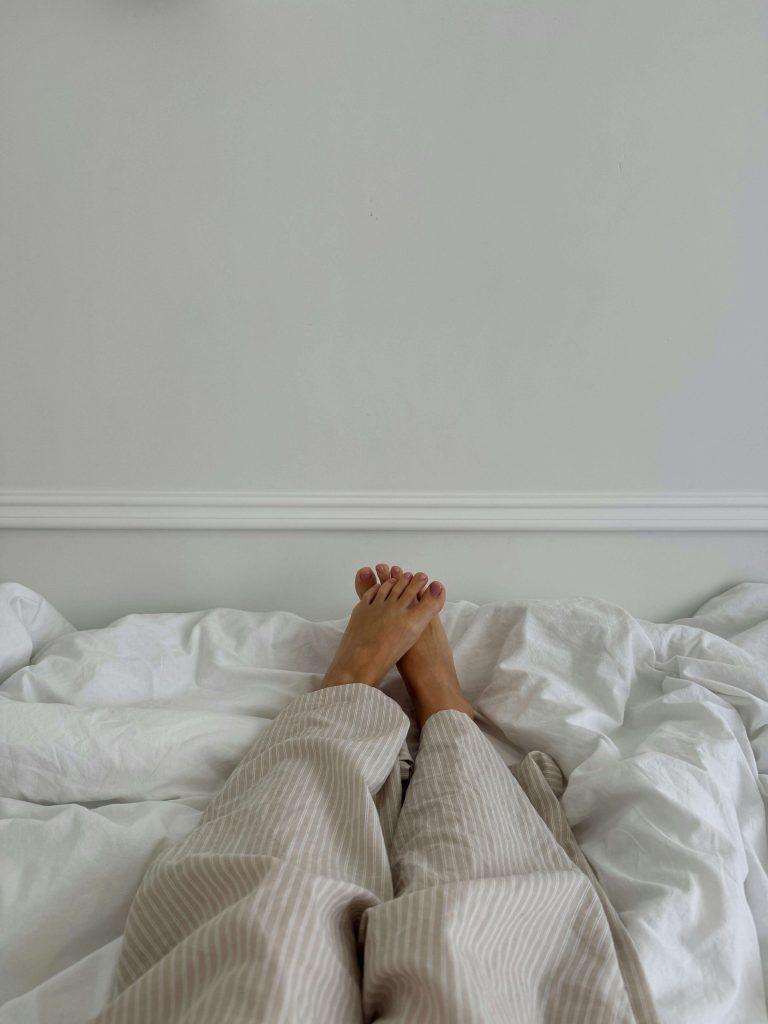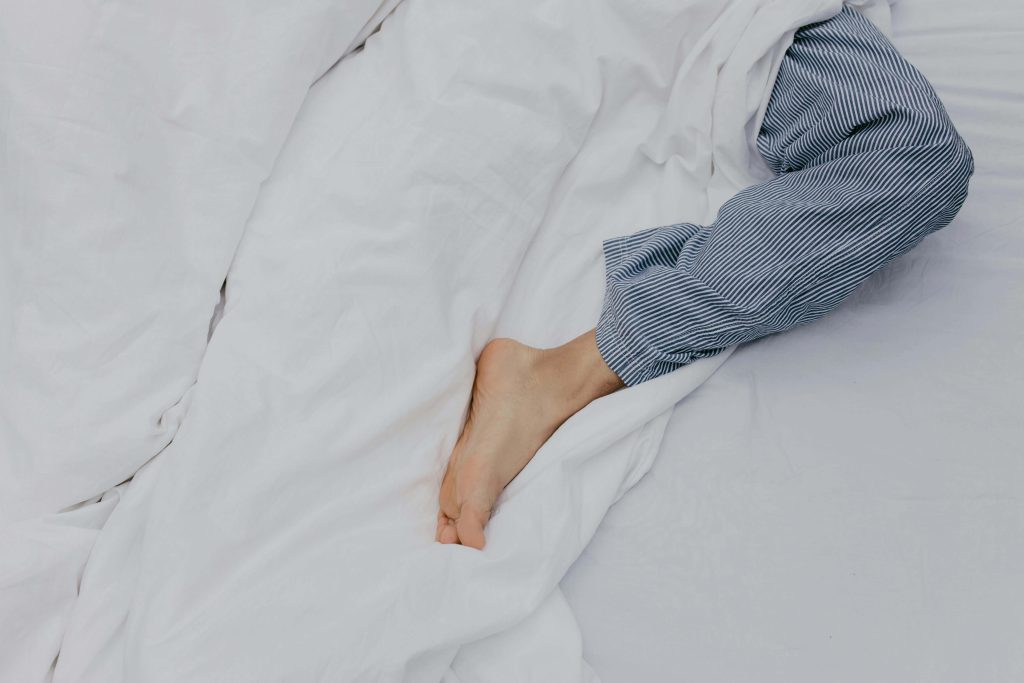
How to Fix Perimenopause Sleep Problems


How to Fix Perimenopause Sleep Problems
Perimenopause – the lead-up to menopause – can be a challenging time for many women. Hormonal shifts during this time can disrupt various aspects of daily life, especially sleep. You may struggle with falling asleep or staying asleep, which can worsen fatigue, hormonal issues, brain fog, and mood.
This article explores the reasons behind perimenopause sleep issues, and holistic approaches to optimize your sleep during this challenging time.
Why Do Sleep Problems Arise During Perimenopause and Menopause?

During perimenopause and menopause, hormonal changes can play major roles in sleep issues. The big one is declining progesterone, but drops in other hormones like estrogen, testosterone, and melatonin can also be at play.
Progesterone Decline
Progesterone is a key calming hormone that helps promote sleep. It gets converted into the neuroactive steroid called allopregnanolone, which enhances the effectiveness of GABA on a receptor in the brain called GABA-A.
As you age, your progesterone levels fall. This means you have less allopregnanolone and thus less GABA-A receptor activity. As a result, you may find it harder to relax, fall asleep, and stay asleep. The brain may also feel more on edge and restless, further impacting your sleep quality.
Low progesterone increases the frequency of sleep disturbances. Also, low allopregnanolone correlates with shallow sleep and more sleep disturbances. If you still have cycles, these issues might be worse during the luteal phase or around PMS.
Estrogen Decline
While we don’t usually think of estrogen as a sleep-promoter, estrogen promotes sleep by:
- Regulating your sleep-wake cycle – Estrogen works on areas in the brain that regulate circadian rhythm and sleep.
- Reduce activity of stimulating neurotransmitters including acetylcholine, histamine, noradrenaline, serotonin, orexin, and dopamine.
- Regulating your body temperature, helping your body maintain a steady temperature for deep sleep. Low estrogen can contribute to hot flashes and sleep disturbances due to body temperature.
These are how estrogen helps decrease the time it takes to fall asleep and the number of times you wake up in the night.
During perimenopause, it isn’t just low levels – it is also the sudden and unpredictable estrogen fluctuations that trigger sleep issues. These spikes and dips are especially common during the menopause transition.
Testosterone & Androgen Changes
As estrogen and progesterone levels start to decline in perimenopause, we see an increase in a hormone called sex hormone-binding globulin (SHBG). This rise leads to an increased level of androgens – including testosterone and DHEA. When this happens, it can cause sleep issues because of changes in airway muscle tone and changes in body fat, which can worsen sleep quality.
Melatonin Decline
Melatonin, your nighttime hormone made in the pineal gland, naturally declines with age. Since estrogen helps to maintain normal melatonin production, its decline in menopause can mean even lower levels. This can impact your body’s natural circadian rhythm.
Estrogen also helps an area in the brain called the suprachiasmatic nucleus (or SCN for short), remain sensitive to light changes. These are important for keeping the sleep-wake cycle on track. Without it, your brain might struggle more with regulating sleep patterns, leading to poor or fragmented sleep.
Why Optimizing Sleep During Menopause Is Crucial

Getting solid sleep during menopause is more than just feeling rested – it is crucial for your overall well-being. Compared to men, women generally get better sleep when younger, but struggle more as they age, particularly in menopause. This life stage increases the prevalence of sleep issues, with stats showing between 16-60% of women become affected. Sleep disturbances, especially trouble staying asleep, are more likely to occur during perimenopause and menopause.
When we have disrupted sleep, it can make common menopause symptoms even harder to manage.
One of the most noticeable impacts of poor sleep is fatigue. When you don’t get enough restorative rest, energy levels plummet, and you might find it even harder to get through your days. This tiredness can also trigger brain fog, leading to issues like difficulty concentrating, remembering things, or thinking clearly.
Mental health is another area that can take a hit when sleep is disrupted. You might find you are more irritable, anxious, or prone to low moods.
Plus, there is a link between sleep and weight management. When you sleep poorly, it can increase your hunger hormones. This can lead to weight gain, especially in the midsection, which is another trend we tend to see as women make this transition.
We also need sleep to support our heart health, immune function, and overall metabolic function. In short, prioritizing sleep during menopause can lower the intensity of menopause symptoms while also impacting your long-term health.
Why Do Perimenopausal Women Wake Up in the Middle of the Night?
Cortisol
In addition to less estrogen, as we mentioned above, there is another culprit that might cause you to wake up in the middle of the night – blood sugar and stress hormones. Cortisol levels and stress response tend to rise during perimenopause and menopause because you have less GABA-A activity. HPA axis dysfunction may also increase and have more impact during this time.
The solution: You’ll most likely benefit from stress management strategies and introducing an adaptogen.
Blood sugar
In women, estrogen naturally enhances the function of insulin. As estrogen drops, your insulin functions less well, so it becomes even more important to optimize your blood sugar regulation with diet and lifestyle.
You may also become more sensitive to blood sugar spikes and dips at night. When blood sugar gets low, your body treats it as an emergency and responds with stress hormones like cortisol and adrenaline. This gets blood sugar back to normal levels. Unfortunately, this surge can wake you up feeling restless and unable to go back to sleep. Even if you don’t wake up fully, this can impact sleep quality and leave you feeling groggy the next day.
The solution: Dr. Sara Szal swears by her continuous glucose monitor (CGM) to identify foods or diet structures that spike and dip her blood sugar for herself and her clients. The CGM devices can pinpoint the problem foods and even stressors that throw you off.
As a general principle, you want to center your diet around proteins and fiber like vegetables, while making carbs a condiment. Some women find they regulate their blood sugar better by eating every 2 – 3 hours, while others by adapting to a lower-carbohydrate diet and spacing out their meals. The Ultimate Nutrition System is a great guide for personalizing your nutrition plan.
Best Sleeping Pills for Menopause and Perimenopause
When it comes to tackling perimenopause sleep issues, it is never just about pills or a single-ingredient supplement. Many of the sleep issues that arise in perimenopause can be tied back to other lifestyle factors that affect sleep. The good news is that lifestyle adjustments, proper sleep hygiene, and addressing hormone changes can make significant impacts.
Several supplements can play a supportive role. Interestingly, many of them are not specifically marketed toward sleep – instead, we look towards supporting stress balance, ensuring you have the right cofactors for your body to naturally fall into rest, and providing vitamins and minerals known to impact your overall health.
By targeting the root causes of sleep disturbances during this stage, like hormonal imbalance, stress, and changes in brain wave patterns, there are some effective options:
Sleep Breakthrough
Sleep Breakthrough is designed to promote relaxation and improve sleep quality. It contains a blend of sleep-promoting nutrients and co-factors for calming brain pathways – vitamin B6, magnesium, zinc, L-glycine, L-taurine, L-theanine, and magnolia bark extract. Combining these ingredients together, can support restful sleep by balancing stress response, enhancing melatonin production, and promoting healthy sleep cycles. The addition of amino acids like glycine and theanine can help calm your nervous system, and magnesium provides extra relaxation support.
The Honokiol (magnolia bark extract) in Sleep Breakthrough helps potentiate GABA-A receptors, while glycine helps cool you down, making it especially helpful for sleep struggles during perimenopause.
Magnesium Breakthrough
Magnesium Breakthrough combines seven magnesium types, plus vitamin B6 and manganese. Combined, the ingredients work synergistically to reduce muscle tension, support neurotransmitter production, and enhance relaxation.
Magnesium is well-studied for its role in sleep. In a review of 9 studies involving 7,582 adults, they found that having enough magnesium is linked to better sleep, fewer daytime naps, and longer sleep.
Another study looking specifically at menopause symptoms found that magnesium supplementation could help. 29 women completed the trial, and results found they had fewer hot flashes and less sweating – two things that can impact sleep in menopause.
Tart cherry is a natural source of melatonin. It also contains potent antioxidants that support natural melatonin production and enhance sleep quality. Magnesium Breakthrough Tart Cherry is a powerful sleep-enhancing combo that may be especially helpful for you.
Adaptogens Like Stress Guardian
Adaptogens, like those in Stress Guardian, can better equip your body to handle stress. With Eleutherococcus, Astragalus, Reishi, Fo-Ti, Goji, Licorice, Schisandra, Asian Ginseng, Tienchi Ginseng, Chinese Sage, Kudzu, Chinese Peony, Cordyceps, and Rhodiola, it can be taken in the morning to help promote sleep later on. Some women may respond better to different adaptogens, as individual tolerance can vary.
Click here to learn more about adaptogens and what they might support.
Phosphatidylserine
Phosphatidylserine is a phospholipid that helps augment cortisol levels, making it particularly useful if you have occasional stress-related sleep disruptions. By lowering evening cortisol levels, it can support a smoother transition into sleep. It might also improve sleep quality, by modulating the stress response overall. For those dealing with menopause-related sleep challenges, it can be a great add-on to your nighttime routine.
Other Things to Consider to Optimize Sleep During Perimenopause

Outside of supplementation, there are many other options to help you get restful sleep during perimenopause. While hormonal fluctuations play a big role in many of the sleep issues that occur during this transition, other factors can also contribute. Getting a handle on these other lifestyle aspects can reduce sleep challenges and help improve sleep quality. Let’s break down some of the most important ones:
Eliminating Sleep Disruptors
One of the simplest things you can do to get better sleep is to tackle sleep disruptors. These common roadblocks, when addressed, can help promote good quality sleep cycles and leave you waking up feeling refreshed. The main ones include:
- Light-dark cycles – you want to get natural light exposures in the morning and cut out any blue light exposure, including from screens, at night. Reducing screen time and making sure your room is dark can help synchronize your body’s natural cycle.
- Temperature is another big one. Many women in perimenopause experience both night sweats and hot flashes. Even outside of this life stage, cooler environments are conducive to better sleep. Tools like the Chilipad mattress cooler could be a gamechanger if heat disrupts your sleep.
Cut Down on Stimulants, Naps, and Alcohol
Caffeine and other stimulants can make it harder to fall and stay asleep, especially during perimenopause, when sleep may already be disrupted. In fact, research finds that caffeine can worsen typical menopause symptoms like hot flashes. Studies find that consuming caffeine reduces total sleep time by 45 minutes and sleep efficacy by 7%.
Reducing or eliminating caffeine in the afternoon and avoiding alcohol close to bedtime can help. Research suggests that keeping caffeine content low and avoiding consuming at least 9 hours before bedtime to not impact sleep.
While you might feel tired mid-day and feel the urge to nap, this can also impact your ability to sleep that night. Aim to keep naps short if you feel like you need it (or avoid entirely) to support a more consistent sleep-wake cycle.
Manage Your Stress
Stress has major impacts on sleep quality, especially during perimenopause when hormone changes can augment your body’s normal stress response. Getting a handle on how you manage stressors can help you get better sleep, and even impact other menopause symptoms.
In one study, researchers developed an 8-week stress management program geared specially for those going through menopause. They found that those who took part in the program had significant improvements in menopause symptoms, sleep quality, mood, and self-esteem compared to those who didn’t . The program included things like lifestyle education, deep breathing, progressive muscle relaxation, and guided visualization.
You don’t need to take part in a structured program, but practices like journalling, mindfulness, and exercise can help reduce stress levels. Building a solid bedtime routine promoting relaxation can also help mitigate any sleep issues that might arise from stress.
Find a Way to Downregulate to Sleep
If you have trouble winding down before bed, there are some things you can do to help overcome this. While this might look different for everyone, techniques that activate the “rest and digest” parasympathetic nervous system might help. These include meditating, vagal nerve stimulation, deep breathing, or even using weighted blankets might be a helpful approach.
In a review study analyzing 398 menopausal participants, researchers found that relaxation therapies reduced overall menopause symptoms. Two of the included studies found significant reductions in symptoms after a 12-month progressive relaxation program, and the improvements lasted for 3-6 months!
A study on hypnosis for menopause-related sleep problems found that the women who used self-hypnosis had significant improvements in sleep quality, with more time spent asleep and reduced perceptions of poor sleep.
Incorporating one or a couple of these into your evening routine might make your sleep transition a bit smoother.

Experiment With Macronutrients During Dinner and Bedtime Snack
The best diet for your sleep is individual, so you want to experiment and journal to find out what works best for you. Some women find they need carbohydrates, especially at dinner, to produce sufficient melatonin for sleep, even if they do well otherwise with a low-carb diet.
Some women may find that eating before bed disrupts their sleep, while others find a bedtime snack helpful to regulate their blood sugar throughout the night. If you’re the latter group, both tryptophan- and melatonin-containing foods may promote better rest:
Melatonin-rich foods: eggs, fish, nuts, cherries, cherries, and strawberries
Tryptophan-rich foods: codfish, shellfish, algae, eggs, soy sesame seeds, sunflower seeds, cheddar cheese, and pumpkin seeds
Keeping a consistent eating schedule and avoiding heavy meals and alcohol before bed can also improve sleep. A balanced diet, one rich in omega-3s, fiber, and low-glycemic carbs has also shown benefits for improving sleep quality.
Get Active
Taking part in regular exercise is fantastic for our overall health, but it might even have greater impacts for getting good sleep during menopause.
In a systematic review looking at behavioral interventions for promoting sleep in perimenopause, researchers found that exercise had moderate impacts on sleep, especially low intensity exercise like walking or light yoga.
Another review of 10 studies found that exercise interventions significantly reduced poor sleep and sleep issues, and improved sleep quality. They also found that more meditative-type exercises had a better impact for enhancing sleep quality.
Bottom line – make sure you are moving! Find an activity that you like, and do it regularly. Not only for better sleep, but for supporting heart health, metabolic function, and overall mood as you transition to menopause.
Speak to a Holistic Women’s Health Doctor About Hormone Replacement Therapy and Compounded Progesterone
Hormone Replacement Therapy (HRT) and supplemental progesterone can help improve sleep if they are deemed appropriate by your healthcare provider.
In a review of 42 studies of 15,468 women, researchers showed that HRT improved sleep quality in women who had hot flashes and night sweats. However, it did not seem to make a difference in women who did not have these symptoms.
Some women, even in early perimenopause, find that low-dose supplemental progesterone enhances their sleep. Keep in mind that progesterone degrades in stomach acid, so if you take it orally, it’ll have to be micronized from a compounding pharmacy. Transdermal preparations that cross the skin directly can bypass this issue.
Consult with your holistic women’s health doctor to determine the type and doses of hormone treatments to optimize your sleep.
Final Thoughts
When it comes to supporting your body as it transitions to menopause, sleep should be one of your top priorities. From targeted supplementation to working on lifestyle habits that might be interfering with sleep, we want to see you succeed. While this transition can come with a host of changes, it is possible to thrive with the proper tools and support.
References
- Woods NF, Mitchell ES. Symptoms during the perimenopause: prevalence, severity, trajectory, and significance in women’s lives. Am J Med. 2005;118 Suppl 12B(12):14-24. doi:10.1016/j.amjmed.2005.09.031
- Troìa L, Garassino M, Volpicelli AI, et al. Sleep disturbance and perimenopause: A narrative review. J Clin Med. 2025;14(5). doi:10.3390/jcm14051479
- Hatcher KM, Smith RL, Chiang C, Li Z, Flaws JA, Mahoney MM. Association of phthalate exposure and endogenous hormones with self-reported sleep disruptions: results from the Midlife Women’s Health Study. Menopause. 2020;27(11):1251-1264. doi:10.1097/GME.0000000000001614
- Slopien R, Pluchino N, Warenik-Szymankiewicz A, et al. Correlation between allopregnanolone levels and depressive symptoms during late menopausal transition and early postmenopause. Gynecol Endocrinol. 2018;34(2):144-147. doi:10.1080/09513590.2017.1371129
- Haufe A, Baker FC, Leeners B. The role of ovarian hormones in the pathophysiology of perimenopausal sleep disturbances: A systematic review. Sleep Med Rev. 2022;66(101710):101710. doi:10.1016/j.smrv.2022.101710
- Zhang Z, DiVittorio JR, Joseph AM, Correa SM. The effects of estrogens on neural circuits that control temperature. Endocrinology. 2021;162(8). doi:10.1210/endocr/bqab087
- Haufe A, Leeners B. Sleep disturbances across a woman’s lifespan: What is the role of reproductive hormones? J Endocr Soc. 2023;7(5):bvad036. doi:10.1210/jendso/bvad036
- Delamater L, Santoro N. Management of the perimenopause. Clin Obstet Gynecol. 2018;61(3):419-432. doi:10.1097/GRF.0000000000000389
- Pandi-Perumal SR, Zisapel N, Srinivasan V, Cardinali DP. Melatonin and sleep in aging population. Exp Gerontol. 2005;40(12):911-925. doi:10.1016/j.exger.2005.08.009
- Kravitz HM, Janssen I, Santoro N, et al. Relationship of day-to-day reproductive hormone levels to sleep in midlife women. Arch Intern Med. 2005;165(20):2370-2376. doi:10.1001/archinte.165.20.2370
- Tandon VR, Sharma S, Mahajan A, Mahajan A, Tandon A. Menopause and sleep disorders. J Midlife Health. 2022;13(1):26-33. doi:10.4103/jmh.jmh_18_22
- Ahmady F, Niknami M, Khalesi ZB. Quality of sleep in women with menopause and its related factors. Sleep Sci. 2022;15(Spec 1):209-214. doi:10.5935/1984-0063.20220021
- Lee J, Han Y, Cho HH, Kim MR. Sleep disorders and menopause. J Menopausal Med. 2019;25(2):83-87. doi:10.6118/jmm.19192
- Landis CA, Moe KE. Sleep and menopause. Nurs Clin North Am. 2004;39(1):97-115. doi:10.1016/j.cnur.2003.11.006
- Woods NF, Mitchell ES, Smith-Dijulio K. Cortisol levels during the menopausal transition and early postmenopause: observations from the Seattle Midlife Women’s Health Study: Observations from the Seattle Midlife Women’s Health Study. Menopause. 2009;16(4):708-718. doi:10.1097/gme.0b013e318198d6b2
- Cohn AY, Grant LK, Nathan MD, et al. Effects of sleep fragmentation and estradiol decline on cortisol in a human experimental model of menopause. J Clin Endocrinol Metab. 2023;108(11):e1347-e1357. doi:10.1210/clinem/dgad285
- Yan H, Yang W, Zhou F, et al. Estrogen improves insulin sensitivity and suppresses gluconeogenesis via the transcription factor Foxo1. Diabetes. 2019;68(2):291-304. doi:10.2337/db18-0638
- Walton C, Godsland IF, Proudler AJ, Wynn V, Stevenson JC. The effects of the menopause on insulin sensitivity, secretion and elimination in non-obese, healthy women. Eur J Clin Invest. 1993;23(8):466-473. doi:10.1111/j.1365-2362.1993.tb00792.x
- Khani S, Tayek JA. Cortisol increases gluconeogenesis in humans: its role in the metabolic syndrome. Clin Sci (Lond). 2001;101(6):739-747. doi:10.1042/cs1010739
- Fuchs A, Baur R, Schoeder C, Sigel E, Müller CE. Structural analogues of the natural products magnolol and honokiol as potent allosteric potentiators of GABA(A) receptors. Bioorg Med Chem. 2014;22(24):6908-6917. doi:10.1016/j.bmc.2014.10.027
- Arab A, Rafie N, Amani R, Shirani F. The role of magnesium in sleep health: A systematic review of available literature. Biol Trace Elem Res. 2023;201(1):121-128. doi:10.1007/s12011-022-03162-1
- Park H, Parker GL, Boardman CH, Morris MM, Smith TJ. A pilot phase II trial of magnesium supplements to reduce menopausal hot flashes in breast cancer patients. Support Care Cancer. 2011;19(6):859-863. doi:10.1007/s00520-011-1099-7
- Howatson G, Bell PG, Tallent J, Middleton B, McHugh MP, Ellis J. Effect of tart cherry juice (Prunus cerasus) on melatonin levels and enhanced sleep quality. Eur J Nutr. 2012;51(8):909-916. doi:10.1007/s00394-011-0263-7
- Losso JN, Finley JW, Karki N, et al. Pilot study of the tart cherry juice for the treatment of insomnia and investigation of mechanisms. Am J Ther. 2018;25(2):e194-e201. doi:10.1097/MJT.0000000000000584
- Pistollato F, Sumalla Cano S, Elio I, Masias Vergara M, Giampieri F, Battino M. Associations between sleep, cortisol regulation, and diet: Possible implications for the risk of Alzheimer disease. Adv Nutr. 2016;7(4):679-689. doi:10.3945/an.115.011775
- Urbanová L, Sebalo Vňuková M, Anders M, Ptáček R, Bušková J. The updating and individualizing of sleep hygiene rules for non-clinical adult populations. Prague Med Rep. 2023;124(4):329-343. doi:10.14712/23362936.2023.26
- Nakshine VS, Thute P, Khatib MN, Sarkar B. Increased screen time as a cause of declining physical, psychological health, and sleep patterns: A literary review. Cureus. 2022;14(10):e30051. doi:10.7759/cureus.30051
- Santoro N. Perimenopause: From research to practice. J Womens Health (Larchmt). 2016;25(4):332-339. doi:10.1089/jwh.2015.5556
- Fan Y, Wang Y, Gu P, Han J, Tian Y. How temperature influences sleep. Int J Mol Sci. 2022;23(20):12191. doi:10.3390/ijms232012191
- Faubion SS, Sood R, Thielen JM, Shuster LT. Caffeine and menopausal symptoms: what is the association? Menopause. 2015;22(2):155-158. doi:10.1097/GME.0000000000000301
- Gardiner C, Weakley J, Burke LM, et al. The effect of caffeine on subsequent sleep: A systematic review and meta-analysis. Sleep Med Rev. 2023;69(101764):101764. doi:10.1016/j.smrv.2023.101764
- Augoulea A, Palaiologou A, Christidi F, et al. Assessing the efficacy of a structured stress management program in reducing stress and climacteric symptoms in peri- and postmenopausal women. Arch Womens Ment Health. 2021;24(5):727-735. doi:10.1007/s00737-021-01106-7
- Innes KE, Selfe TK, Vishnu A. Mind-body therapies for menopausal symptoms: a systematic review. Maturitas. 2010;66(2):135-149. doi:10.1016/j.maturitas.2010.01.016
- Otte JL, Carpenter JS, Roberts L, Elkins GR. Self-hypnosis for sleep disturbances in menopausal women. J Womens Health (Larchmt). 2020;29(3):461-463. doi:10.1089/jwh.2020.8327
- Erdélyi A, Pálfi E, Tűű L, et al. The importance of nutrition in menopause and perimenopause-A review. Nutrients. 2023;16(1). doi:10.3390/nu16010027
- Lam CM, Hernandez-Galan L, Mbuagbaw L, Ewusie JE, Thabane L, Shea AK. Behavioral interventions for improving sleep outcomes in menopausal women: a systematic review and meta-analysis. Menopause. 2022;29(10):1210-1221. doi:10.1097/GME.0000000000002051
- Qian J, Sun S, Wang M, et al. The effect of exercise intervention on improving sleep in menopausal women: a systematic review and meta-analysis. Front Med (Lausanne). 2023;10:1092294. doi:10.3389/fmed.2023.1092294
- Cintron D, Lipford M, Larrea-Mantilla L, et al. Efficacy of menopausal hormone therapy on sleep quality: systematic review and meta-analysis. Endocrine. 2017;55(3):702-711. doi:10.1007/s12020-016-1072-9
- Nagy B, Szekeres-Barthó J, Kovács GL, et al. Key to life: Physiological role and clinical implications of progesterone. Int J Mol Sci. 2021;22(20):11039. doi:10.3390/ijms222011039
